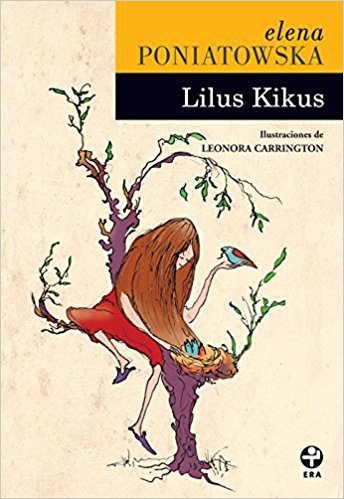
Illustration by Leonora Carrington.
I’m grateful to the same person who introduced me to the work of Tómas Eloy Martínez for also pointing me towards Elena Poniatowska, one of Mexico’s most celebrated and talented writers. Poniatowska, now 85, has been writing since the 1950s, pushing boundaries in both journalism and fiction. It’s a pity more of her work hasn’t yet been translated into English (and I deeply regret not knowing Spanish), and she remains little known outside Latin America; certainly it is an apposite time to return to her polemical writing on the 1968 student massacre and on the government’s failings surrounding the 1986 earthquake.
This little collection, translated with a substantial introduction by Elizabeth Coonrod Martínez, focuses on Poniatowska’s fiction writing, bringing together short stories and novellas she wrote and published during the 1950s–70s. These are arranged together to give an overview of Poniatowska’s feminist thinking and to highlight the lack of equality between men and women in Mexican society at the time of writing. Though of course, it would be ridiculous to say they have no resonance today. They are: Lilus Kikus, The Philosopher’s Daughter, Fifth Call, Happiness and You Arrive by Nightfall.
It’s a surprise to hear Lilus Kikus described as a children’s story, as although she makes heavy use of fairy tales and rich description, Poniatowksa’s writing evokes Kafka and D. H. Lawrence for me more than Dahl or Carroll. Lilus Kikus is a series of vignettes from the life of a young girl, Lilus, who is going through the process of understanding the world around her, and who gradually must become aware of how the world sees her. She watches passers-by and discovers the minutiae of her world through rich sensory encounters, from the warm birds she has held to the visceral pride she feels in displaying her cuts and scrapes to curious boys (but she’ll be paid in cash rather than kisses thank you). She sits on a wall, fascinated by an old philosopher, who looks for meaning only in his books rather than outside his window. When he notices her, the philosopher is charmed, but Lilus is soon drawn away by her mother, who will send her to convent school, where she’ll be taught the proper way to see the world. Lilus relishes a lot of the knowledge she’s taught, and she has rebellious friends and good friends; the rebellious one is banished, and the good one is strangled by her husband.
Lilus is moulded by her surroundings, and in the end we are told that she is able to recognise the signs around her and act accordingly. Interpreting the close of the story is tough; it’s long been seen as an ending in which she straightens up and conforms, leaving her tomboyish, inquisitive youth behind her in order to become an obedient, proper young woman. Martínez thinks it’s more hopeful than that, though I struggled to see it in the ending’s abruptness. Reflecting on the story as a whole, perhaps there’s hope in the fact that if Lilus can observe the ways in which society seeks to control her, she can control her own responses, but it’s a tenuous hope at the end of a dreamy, meandering little tale.
Things don’t improve for The Philosopher’s Daughter, which seemed to me like a nightmarish, feminist reading of one of Kafka’s nasty little stories like A Country Doctor. The references to fairy tales are explicit, and the descriptions of the philosophy master’s room are consistently otherworldly: the place seems almost submerged in Poniatowska’s watery metaphors, the challenger to the master’s dominance a barely-there shadow of malice as his mere presence brings destruction into the house.
She stops smiling at her fairy godmother, at the enchanted carriage, at the crystal slipper and the well, and instead looks intently at her pricked fingers.
The philosopher’s daughter is not accomplished; she’s pricked her fingers with her poor efforts at binding her father’s books, confined to a dark corner of his debating chamber where he and his pupils share and consume knowledge for knowledge’s sake, and she keeps them well supplied with port and biscuits, but is not permitted to join in. Her pricked fingers are very real, but like Sleeping Beauty, her parent is neglectful of the danger facing her, and she is about to be enchanted into an affair that is nothing but artifice. Her father’s challenger, stung by the lack of recognition he receives from the group, seduces her as a way to get back at his master, and his victory is a tragedy for the daughter.
Each furnishing the poet touched fell to the floor in pieces. The girl had to reconstruct them piece by piece quickly, before his imagination could destroy the final details. His cup of coffee evaporated in his hand and she had to take great care to bring him back to reality and prevent the others from becoming aware of his many destructions.
The boundaries between reality and Poniatowska’s fanciful, elaborate metaphors are thin, adding to the fairy tale-like tone of the story. The ending is again a mixture of the abrupt and the obfuscated; details, like the detail of Lilus’ friend’s transgression that got her sent from convent school, are omitted. Poniatowska prefers to be allusive than to be vulgarly direct. This is somewhat carried over into Fifth Call and Happiness, both of which are about the joy of physical intimacy and the feeling of overwhelming love, but both remain underpinned by the isolation of the individual. The prose in these reminds me strongly of D. H. Lawrence’s rich, indirect descriptions in Lady Chatterley’s Lover and Women in Love: it’s an ambitious shot at pinning down aspects of intimacy that are personal and mutable, and I think Poniatowska on the whole is more successful than Lawrence, not least because of the empathetic female gaze she uses.
Fifth Call is about an unmarried couple who meet up in hotel rooms for sex; they idly browse local apartments, but they never commit to them, nor to the relationship. The woman, Julia, is clearly more invested in the relationship than Rodrigo is, and the story opens with an effective, telling juxtaposition of introduction and dialogue:
And words of love—that awkward, stuttering language—surged.
“…”
“…”
“Are you cold?”
“No.”
During sex they have no problems expressing themselves, but afterwards they grow apart almost instantly. The story is structured around Julia’s observations, particularly of Rodrigo, whose face and demeanour seem so different to her as they dress, and when they’re outside the hotel room. It’s a tale about inertia, and though there is no judgement of the young couple it’s clear that Rodrigo has the autonomy to be able to come and go as he likes, whilst Julia must be content with accepting her lot. She’s a willing participant in the relationship, but she’s never able to have any control over it.
In Happiness things seem a little more equal, at least because the relationship appears to be more established, with a slightly personalised room rather than a thin-walled, multicoloured hotel room. Yet it is again very clear that the woman is the more vulnerable person here: she knows how necessary she finds her partner, her thoughts circling this fearful realisation even as he dozes off. I’m not a fan of the ‘needy girlfriend worrying about what her boyfriend’s thinking’ trope, because it’s usually used as another stick to beat women with: ‘ugh chill out, he’s just thinking about sport! Don’t be so clingy!’ In this setting though — precisely the kind of cultural and social setting that helped to form the stereotype — how can you blame the one with no power in the relationship for worrying that she isn’t needed as much as she needs her partner? The narrator of Happiness is, for the most part, happy, but she fears the gulf that must always exist between two discrete entities, eventually leaving the room when her partner falls asleep; as he leaves her for unconsciousness, she must physically leave him too, in order to remind herself of her separate nature. It’s perhaps the most honest, explicit narrative in this collection of short stories.
Finally, You Arrive by Nightfall is the funniest of the group, again returning to the Kafka-esque, but confounding bureaucracy with a guileless femininity that one suspects Kafka would have found as threatening as the judge in this novella does. Apparently the movie it was adapted into was just an OTT piece of erotica, which makes it sound like those who adapted it never read the story at all. The story is of a woman called Esmeralda who is married to five men: one of the men finds out and his pride is hurt, so he brings charges of bigamy. In the court, the judge sweats over the imagined depravity of this woman’s life, whilst she smiles sweetly and fails to understand any of his stuttering references to her sex life. She maintains that, as a nurse, her five marriages are just an extension of her desire to help others: she met each man when he needed help with some injury or ailment, and now she organises their lives, and she knows that in this story, she is the necessary one. Their lives fall apart without Esmeralda spending a day of each week with them and devoting her weekends to their ironing.
Eventually her situation wins the whole court-house over, the story culminating in a conviction that no one seems to want, with all those who have been touched by Esmeralda’s presence congregating at the prison for cakes and a catch-up. Even the husband who brought the charges regrets his actions and continues to visit her in prison. The women in the court-house are smitten, proud of Esmeralda’s unapologetic responses, and the isolated existence each seemed to have is swept away as they are united in their responses to her trial. A few references here and there make it clear that, had this been about a man with multiple wives or mistresses, no one would have batted an eyelid.
The collection ends on a relatively triumphant note then, moving past the isolated fears of the women in Fifth Call and Happiness to Esmeralda’s strange kind of saintliness. Poniatowska’s writing is synaesthetic and rich, evoking vivid internal monologues and a clearly-defined sense of place. I’d love to read more of her writing, particularly if it’s translated in the sensitive, idiosyncratic manner that Martínez seems to have achieved so well.
Advertisements Share this:




